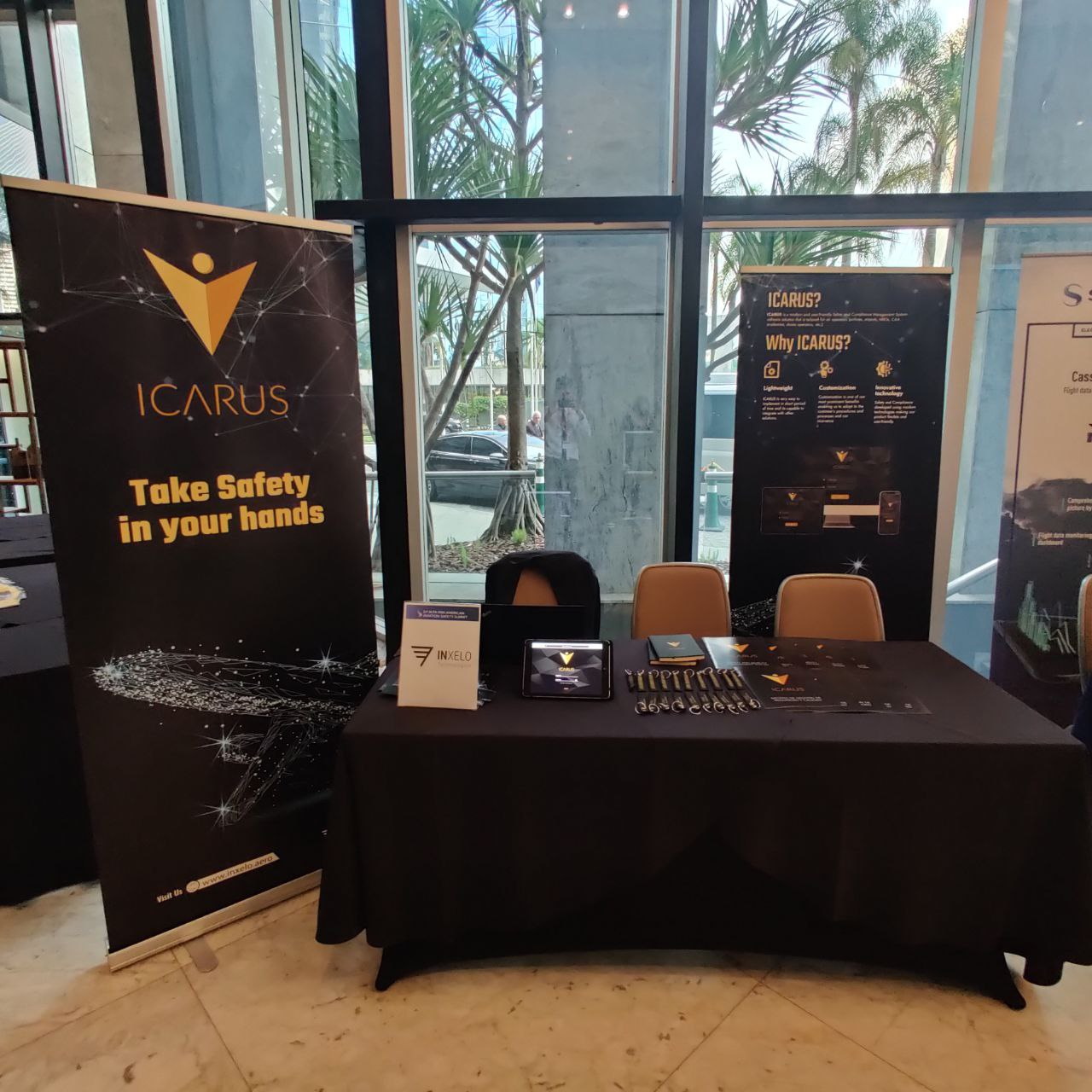SÃO PAULO, BRASIL – this year’s ALTA’s Safety Summit was held in Hilton Hotel in Brazilian business capital, São Paulo. This year’s event is already 11th edition but first after 2019 due to COVID-19 pandemic.
ALTA Safety Summit conference was held over two days, 7 and 8 June 2022. Our team has prepared a summary or review of the presentations at the conference. We were pleasantly surprised by the level of organization and would like to send our gratitude for all the help to Jose Ricardo Botelho, Virginio Corrieri and ALTA’s team.
DAY 1 – 07 June 2022
The first day of the conference was opened by the executive director and CEO of ALTA, Jose Ricardo Botelho, who gave a warm welcome to the guests and presented some of the ALTA’s progress with over 145 members and continuing to strengthen the standards in Pan America.
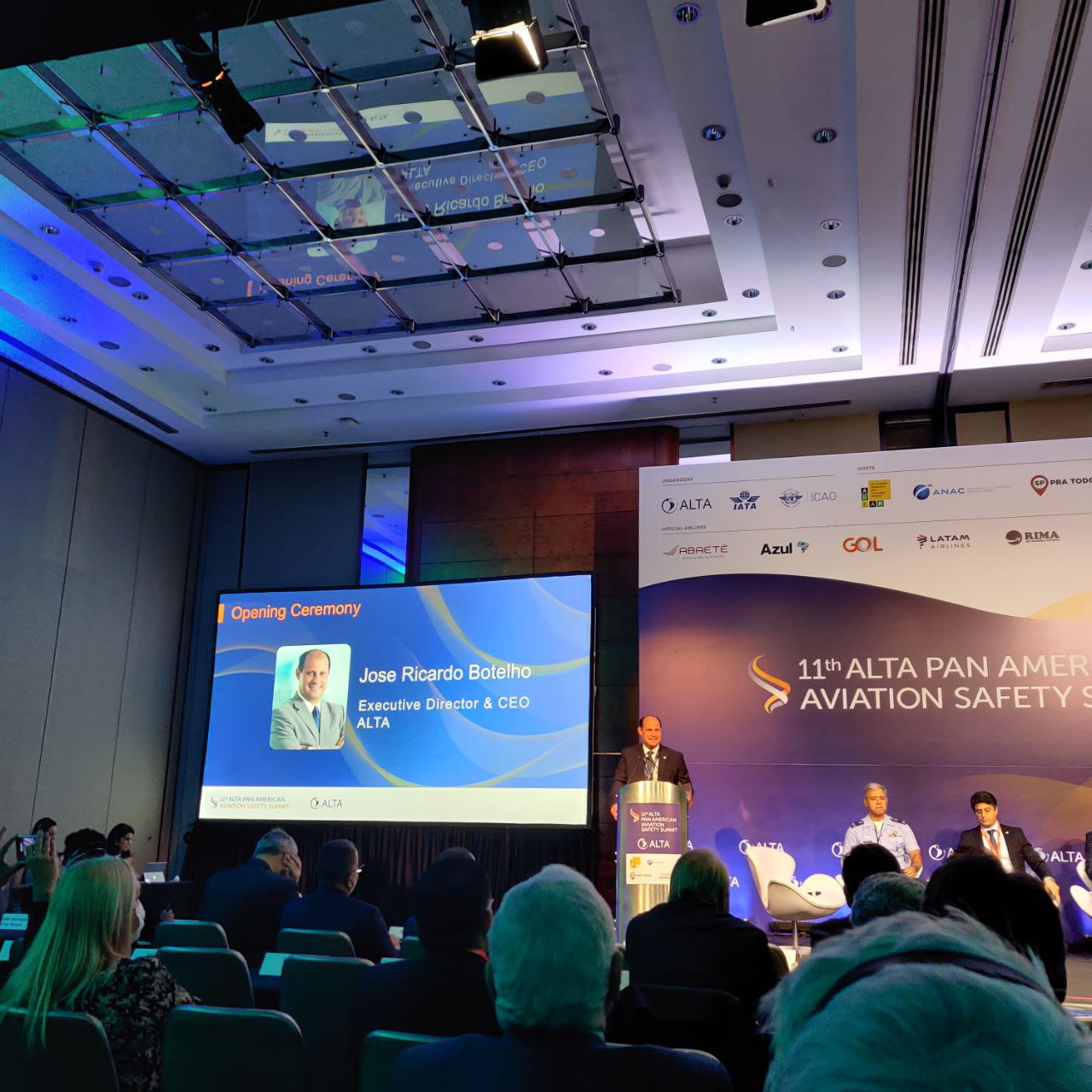
Jose Ricardo Botelho opening ceremony
Next was a special message from Juan Carlos Salazar, Secretary General / International Civil Aviation Organization (ICAO), who gave a video message to the participants saying that the recovery from COVID-19 pandemic is going very well with over 65% increase of traffic between January-April in comparison to the same period in 2021. ICAO projects stronger recovery during the year and also its core focus is resilience and innovation.
We had an honor to have a special guest from USA – Billy Nolen, Acting Administrator at Federal Aviation Administration (FAA) who was also a Captain in American Airlines. Mr Nolen was speaking about safety culture and how important is to implement successful safety culture in airlines. He has seen one of the best safety cultures at Qantas Airlines which helped them to never have an accident in their long history over 100 years. Also Mr Nolen sees the same great safety cultures implemented at FAA. He mentioned that safety cultures are at different maturity around the world, but he sees Brasil as a great example of safety culture and stressed that Brasil is an important partner for FAA. Every mature safety culture empowers people to speak up where he gave few nice examples of such culture working towards improving safety including recent event in USA where a pilot of Cessna aircraft was left incapacitated during flight and the passenger landed the plane with the coordinated help of air traffic controllers.
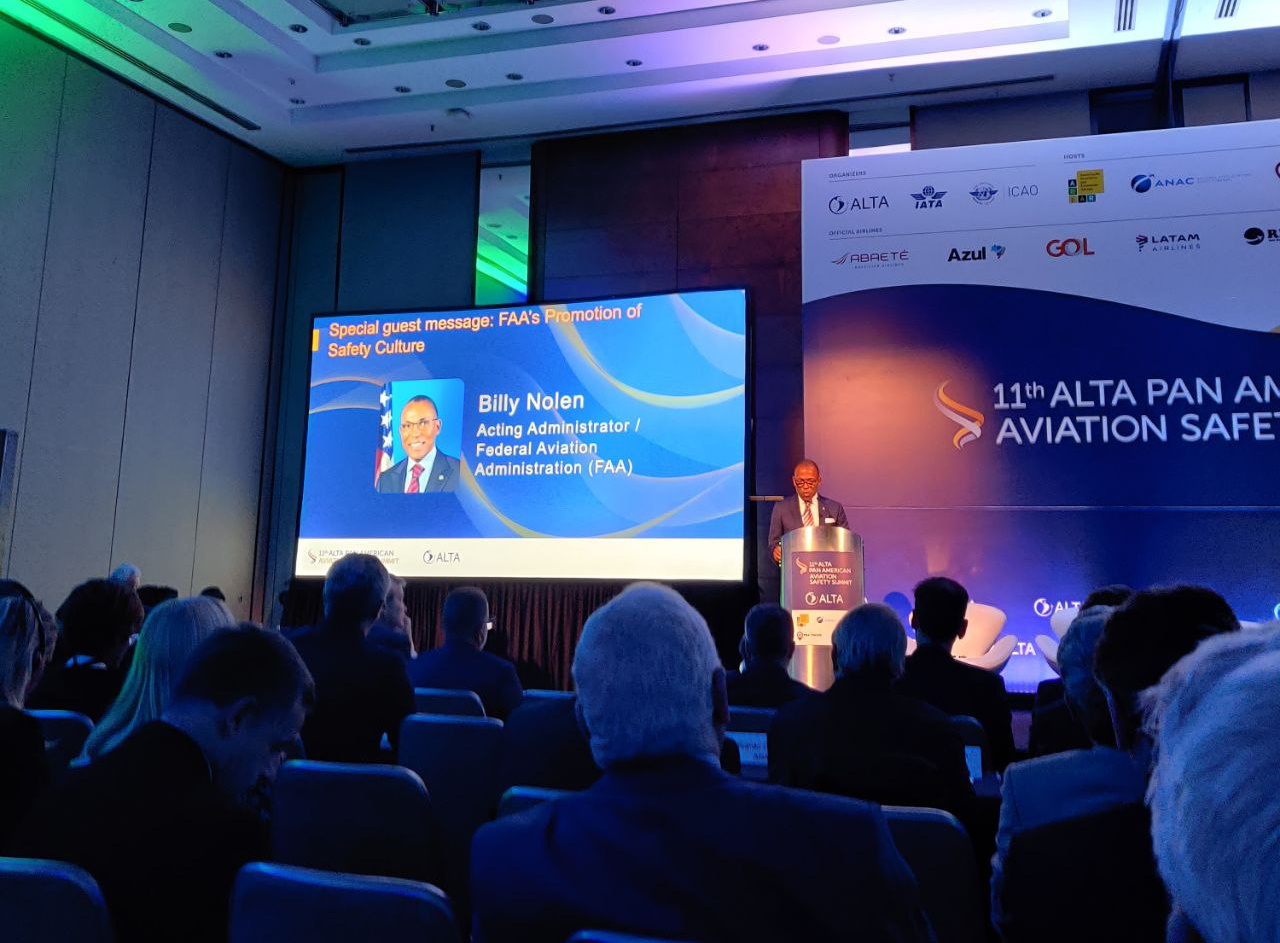
Billy Nolen, Acting Administrator at FAA
The following presentation was a very intriguing presentation by Capt. Rafael Rastrello, Director of Safety at Latam Airlines Group. Capt. Rastrello gave an insight how his company is exploring Safety II concept meaning that they are focusing on data when everything is going good. He showed that incidents and accidents make up only 3% of data and other 97% is not captured because they were incident-free. Having a lot of data is also a challenge and Latam is focusing on right data taking into account bias. Captain Rastrello highlighted bias as important aspect when analyzing the data. He segmented bias onto narrow framing, confirmation bias, short-term emotions, availability bias and overconfidence. It was certainly impressive what Latam is doing and how they developed their system of data analysis. Having data of 5000 flights per day totaling 9 petabytes of data they went on to further analyze the data on 4 categories calling them 4 V’s:
Volume, Velocity, Variety and Veracity.
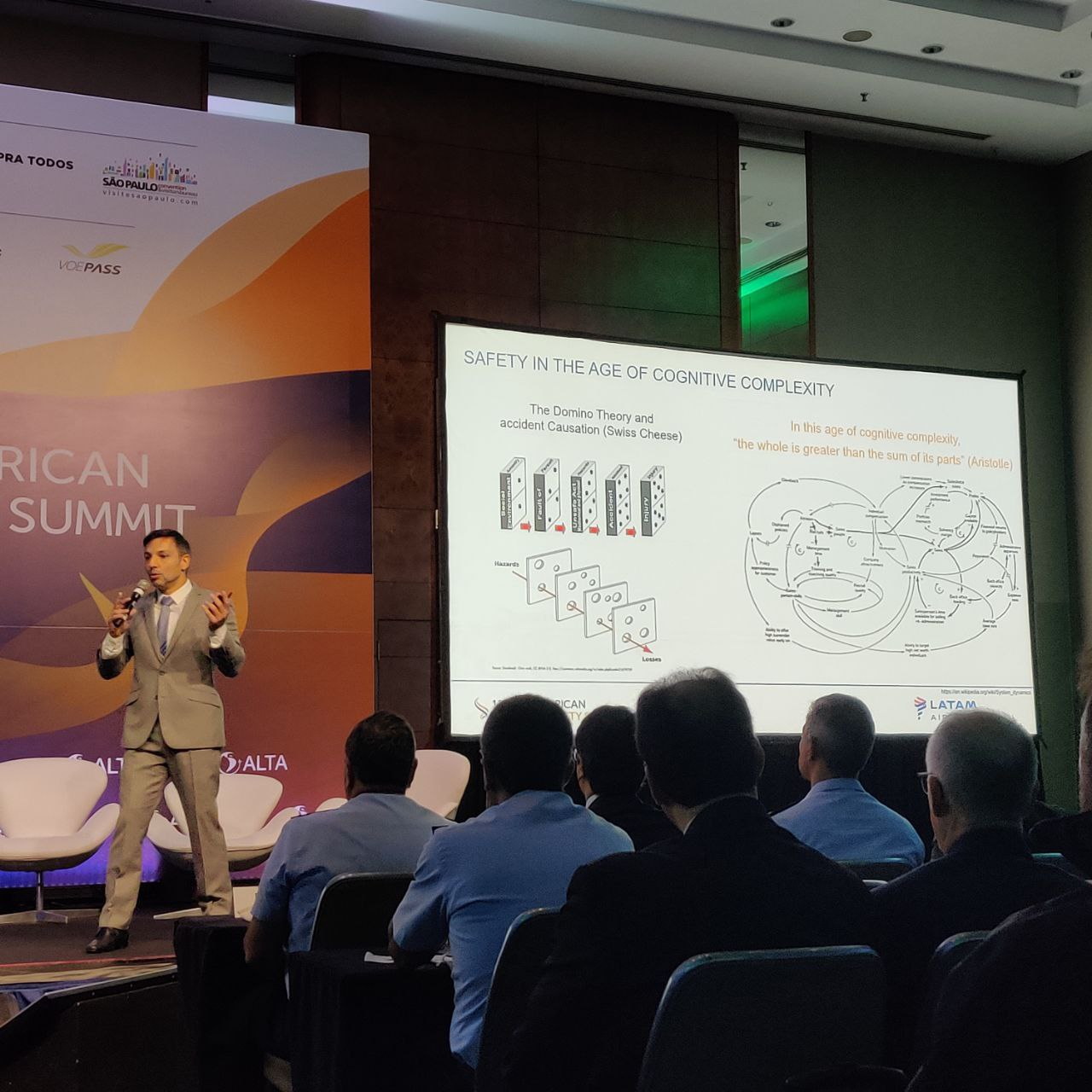
Rafael Rastrello, LATAM Airlines Group
After the coffee break, we had an interesting panel “Pilot`s Mental Health – Peer support advances” between the psychologics moderated by Capt. Marcelo Marcusso, Safety Manager at LATAM Airlines Group. Panelists included:
Psychology and aviation – Laura Almeida Antunes, Psychologist
Investigation overview – Vanessa Vieira Dias Kfouri, Psychologist / Investigation Department, Aeronautical Accident Investigation and Prevention Center (CENIPA)
FAA’s aviation medical programs – Dr. Susan Northrup, MD, FAA Office of Aerospace Medicine, Federal Air Surgeon
“Seguramente” Program – Dr. Lia Melo, Head of Aerospace Medical Health / LATAM Airlines Group
The main topic was how much progress has been made for pilot’s mental health where during COVID-19 pandemic this industry was heavily hit and a lot of pilots were left jobless. There was an increase in pilot depression and suicidal idealization during the pandemic. There was and still is a stigma on pilots and discrimination if pilots speak up about their mental health issues.
In the middle of day 1 we had a special video message from famous C.B. “Sully” Sullenberger (U.S. Mission to the International Civil Aviation Organization) who talked about how to create a good safety culture. Some of the main takes of the presentation were that negative culture comes from inaction, safety culture comes from the top from the leadership, there should be a culture of accountability and finally that culture cannot exist in isolation.
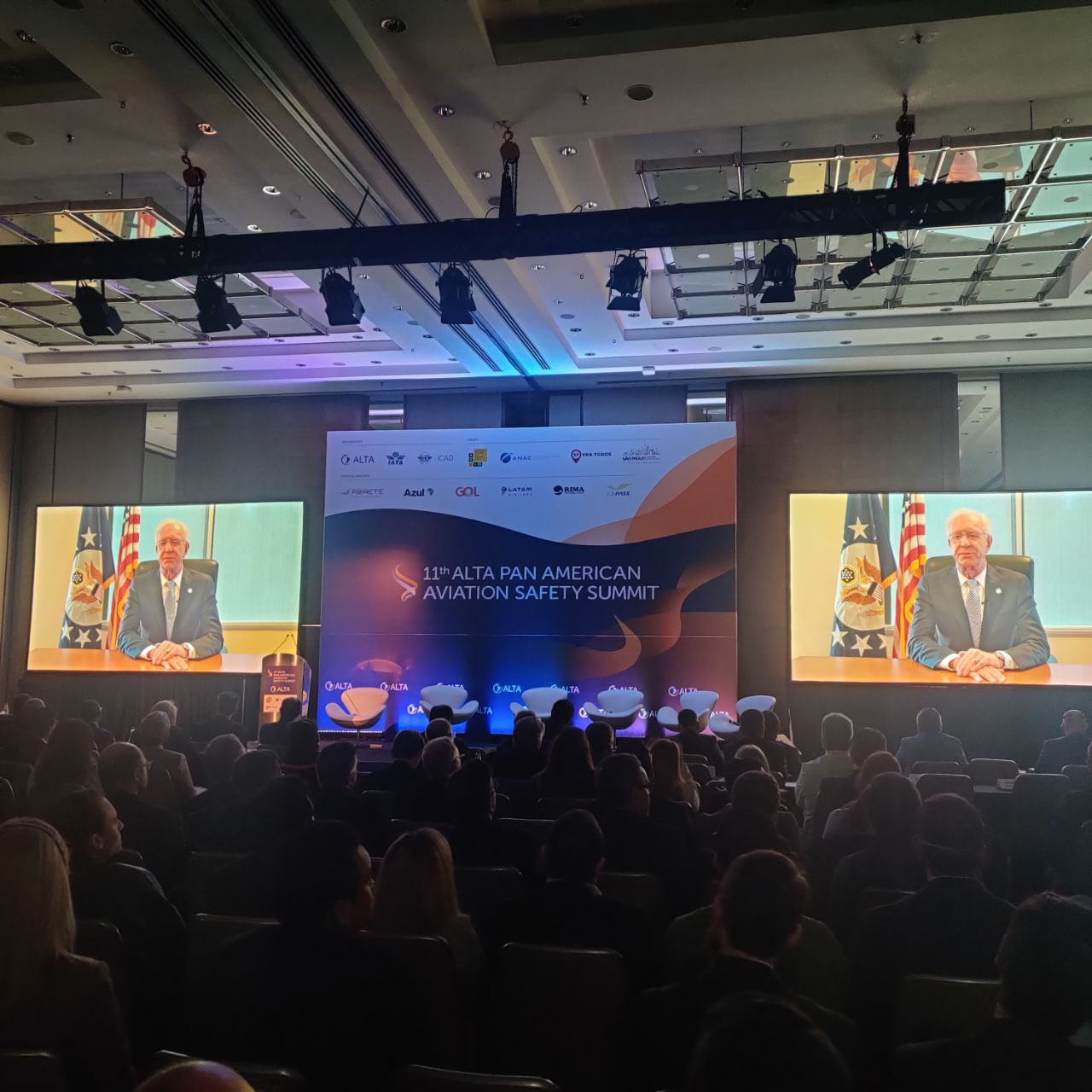
Capt. “Sully” addressing the conference via video
After lunch break, the afternoon presentations started with “Regional Aviation Safety Group – Pan America (RASG-PA) and Pan American Regional Safety Team (PA-RAST) update” by Santiago Saltos, Regional Safety Director / Airbus, and Industry Co-chair / PA-RAST. Some of the main outcomes of Pan America group were that they developed over 30 safety enhancements since 2010 (CFIT, LOC-I, RE, MAC), 0 fatal accidents in 2021, 2.18 accident rate in 2021, new handbook to comply with the RASG TORs, development and publication of RASG-PA Dashboard and 2 high impact projects fully implemented (FDAP & PBN) among other things.
Next on stage was another interesting presentation “ICAO Annex 13 – Accident Investigation coordination efforts through the Region” by Robert L. Sumwalt, Executive Director, Center for Aviation and Aerospace Safety at Embry-Riddle Aeronautical University (Former Chairman, NTSB). He spoke about his career where he was the main accident investigator for NTSB with some interesting stories from his time as a pilot of US Airways company that merged later with American Airlines. Robert spoke also about safety culture which he named “informed culture” and it consists of Just Culture as its foundation and its pillars “Trust” and “Open reporting”. Robert mentioned also how complacency can play a crucial part in safety and that it should be taken into account.
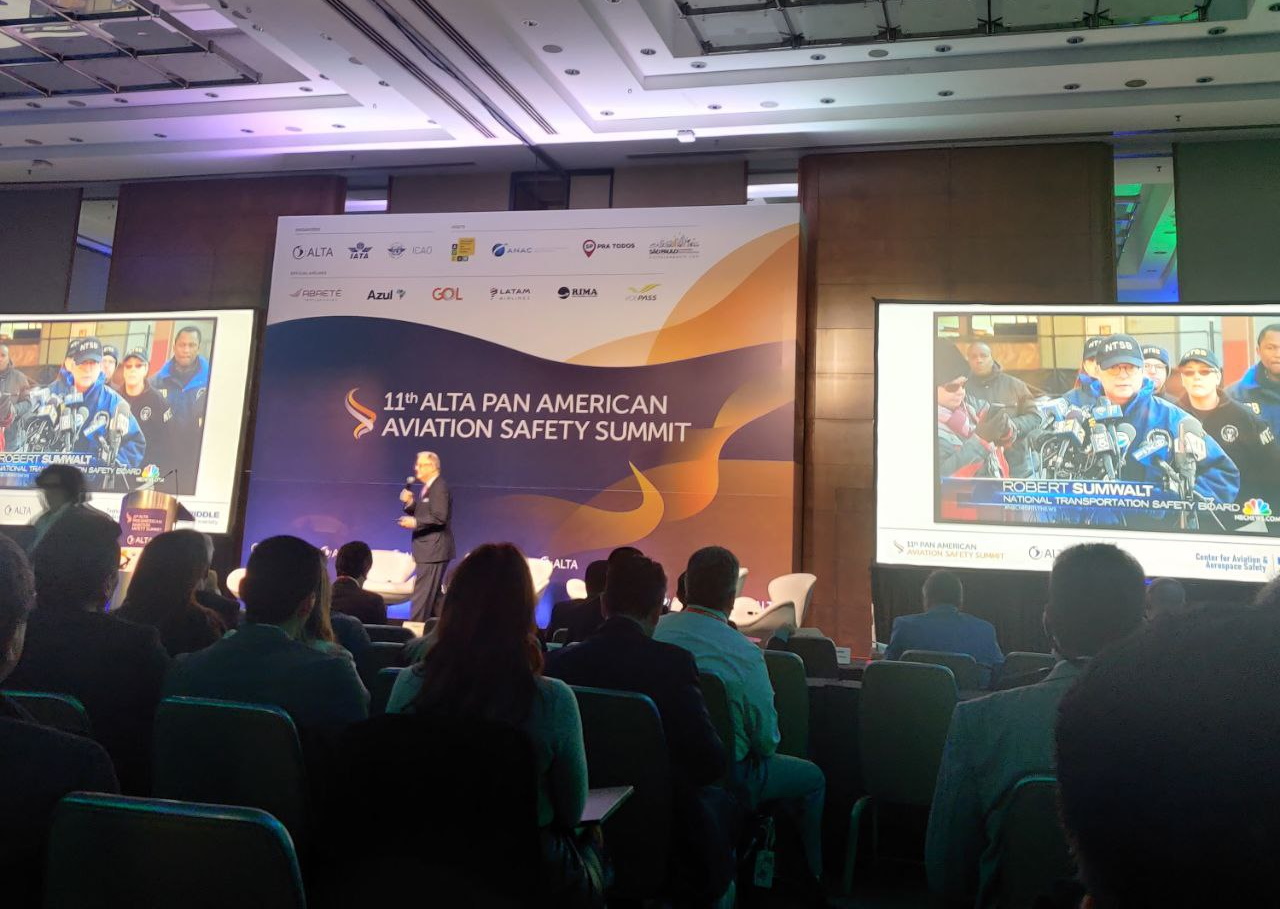
Robert L. Sumwalt, Embry-Riddle Aeronautical University
After Mr. Saltos, we had a panel discussion “Safety – Future challenges” moderated by Sophia Ghezai, Program Director at Flight Safety Foundation.
Panelists:
Training – John R. Watret, Chancellor at Embry-Riddle Aeronautical University
Single-pilot operations – Capt. Bryan Lesko, Pilot at United Airlines and Chair, Aircraft Design and Operations Group (ADO) at Air Line Pilots Association (ALPA)
Long non-stop flights – Capt. Juan Carlos Gonzalez Curzio, VP Flight Safety at AeroMexico Group
5G concerns – Capt. Renan Frota, Manager of Safety Management System (SMS) Risk at Azul Linhas Aéreas Brasileiras and Roberto Honorato, Head of Airworthiness Department / Brazilian National Civil Aviation Agency (ANAC).
After the coffee break, we had a Madrid-based presenter Capt. José A. Ruiz Llorente, Regional Director Operations, Safety and Security, The Americas at International Air Transport Association (IATA) who had a presentation “New IOSA Risk Based Approach”. Capt Jose talked about new concept “Maturity assessment” – The maturity assessment will introduce a more structured and comprehensive way of providing the airline with an evaluation of its relevant safety systems and programs. This will further assist in determining the next steps in improving its operational safety. The idea behind this concept is to tailor the audit to the operator’s critical points, Today, All ISARPs are audited regardless of their universal criticality while in the future the scope is tailored to the Operator’s operating profile and audit history while ISARPs with low criticality may be audited at lower frequency to allow focus on high-criticality ISARP.

The penultimate presentation of the first day was a panel “Regional Aviation Safety key points” moderated by Raul de Souza, Technical Consultant at Brazilian Airlines Association (ABEAR)
Panelists:
Infrastructure – Capt. Salomão Donini Ensslin, SMS Manager / RIMA
Training – Capt. Ravei Nunez, Chief Training / Tropic Air
Regulatory issues – João S. D. Garcia, Head of the Department of Flight Standards / Brazilian National Civil Aviation Agency (ANAC)
Benefits of audit programs – Capt. José A. Ruiz Llorente, Regional Director Operations, Safety and Security, The Americas / International Air Transport Association (IATA).
Some interesting presentation including RIMA’s SMS approach in their aero taxi operations, use of Redbird simulator that helps a lot Tropic Air a company that can have more than 10 take offs and landings per day per pilot.
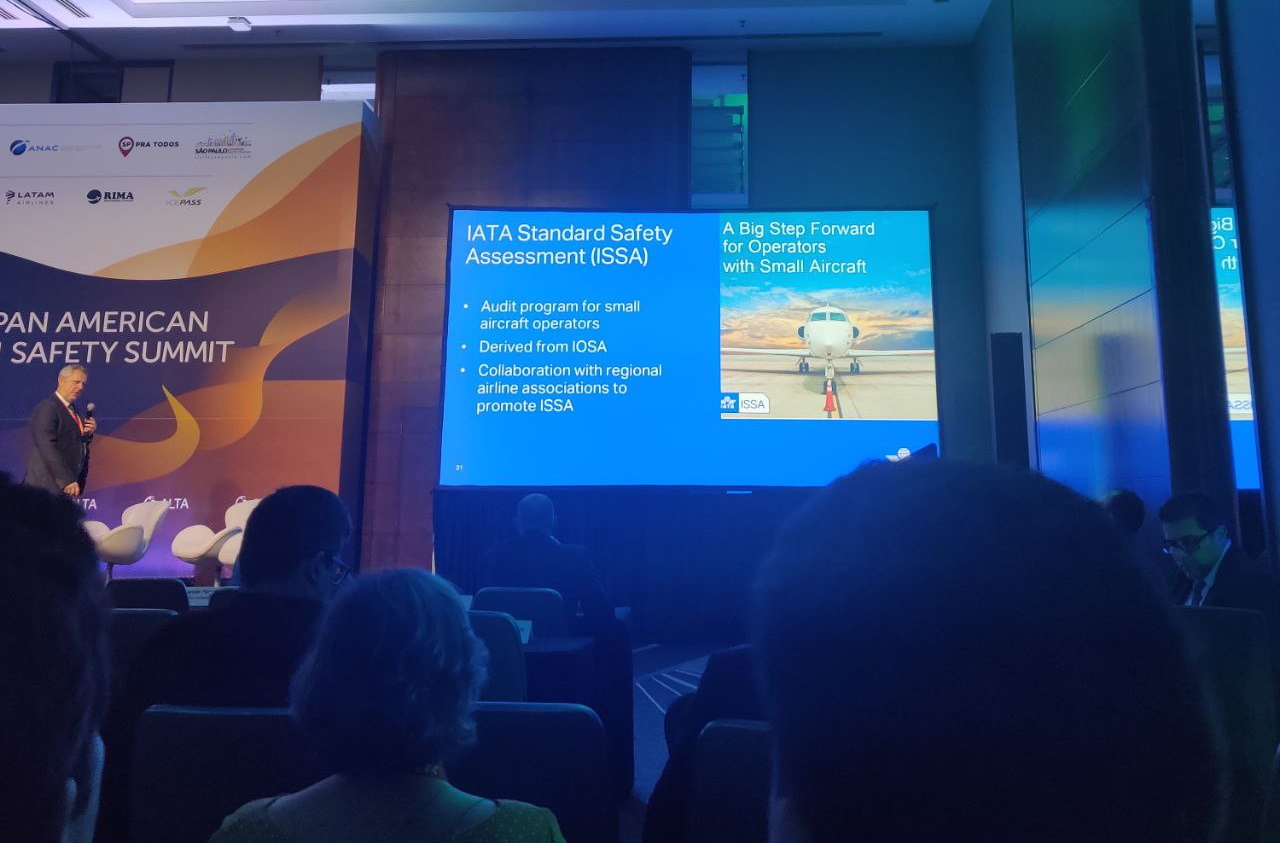
Jose A. Ruiz Llorente, IATA
The last presentation of day 1 was quite interesting presentation also for our team from the point of technology as Miss Luci Holemans, FAA Air Traffic Organization Cybersecurity Group (ACG) Manager spoke about “Cyber Safety”. Miss Holemans showed how threat landscape is getting smarter and how we need to work on our cyber defenses. FAA is focused on adopting zero-trust architecture which is a US Federal Government strategy to move defenses from static perimeters to focus on authenticating, segmenting and monitoring users, assets and resources within the newtork.
DAY 2 – 08 June 2022
After a long but equally interesting presentations, day 2 was opened by Juliano Noman, Director-President at Brazilian National Civil Aviation Agency (ANAC) with the presentation “The modernization of the Brazilian aviation – Reflexion on Safety”. Brasil is constantly improving its safety standards and ANAC is doing a hard job of implementing its goals. Further measures on Safety include revision of the Brazilian State Safety Program (SSP) with Brazilian Air Force, publication of safety culture survey, centralized occurrence reporting, development and publication of guidance material, new regulation on safety data protection etc.
The rest of the day was fulfilled by panels “Manufactures info share – Future technologies for Safety improvement” moderated by Capt. Christopher Collins, Director of Flight Safety at Delta Air Lines
Panelists:
Airbus – Rudy Quevedo, Regional Safety Director for Americas
ATR – Geraud de Rivals-Mazeres, Regional Flight Safety Director
Boeing – Capt. David “Sam” Goodwill, Senior Safety Pilot
Embraer – Patrice London Guedes, Performance Engineer – Technology Development E2TS Project – Team Leader,
then the next panel Air Traffic Management – Safety key points
Moderator – Javier Alejandro Vanegas, Director for Latin America and Caribe / CANSO, and Industry Co-chair / RASG-PA
Panelists:
Argentinian Airspace / New actors in the skies – Diego Gamboa, Planning Manager / Empresa Argentina de Navegación Aérea (EANA)
Turning VFR approaches into IFR using PBN – Javier Puente, SAM Regional Officer, Safety Implementation / International Civil Aviation Organization (ICAO)
Surface surveillance for air traffic control (ATC) – Sergio Martins, Director, Air Traffic Management / SAAB
Caribbean and Central America air traffic management initiatives – Julio Siu, Deputy Regional Director, NACC Regional Office / International Civil Aviation Organization (ICAO)
and final panel: Airlines info share – Safety Management System during the Pandemic – Lessons learned
Moderator: Nicholas Reyes, Director, Western Hemisphere Office, International Affairs / Federal Aviation Administration (FAA)
Panelists:
Airline maintenance – Capt. Alvaro Pereira, Manager of Operational Safety (Flight) / Copa Airlines
Recency / training – Capt. Chris Moran, Sr Manager, Manager – Flight ASAP & Major Investigations, Operations Safety & Compliance / American Airlines
Airline management of change – Capt. Danilo Andrade, Director of Flight Operations / Gol Linhas Aéreas
Business continuity – Capt. Ignacio Crowder, Head of Human Factors and Airport Operational Safety / Aerolíneas Argentinas
The final presentation of this year’s ALTA conference was by David Zwegers, Director, Global Safety Strategy at Boeing Aviation Safety who talked about “What’s Next In Our Ongoing Journey” mentioning many different aspects of safety improvement including employing evidence based training programs to help pilot trainings.
The event was closed by ALTA’s main guys Jose Ricardo and Virginio with an announcement that the next year’s conference will be held in Santiago, Chile!
Our team participated this year’s event with a booth stand and we are looking forward meeting you again next year in Chile!
